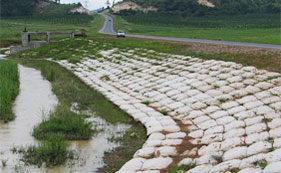
 Back to List
Back to List
Geotextile tube bag is a new type of sludge dewatering consolidation technology, in the construction site will mud pumping by pumping system has higher strength and filterability of tube bag, bag of localized wall geotextiles and drainage, by gravity and bag wall tension, to make the moisture in the mud discharge quickly, and the solid particles in the mud are retained in the bag. This kind of dewatering technology can reasonably customize the tube bag size and material parameters according to the site conditions, mud concentration, soil particle gradation characteristics and quantity. It is not only convenient for construction, but also can be implemented in large quantities on multiple working faces. Besides, there is no secondary pollution, it is clean and environmental friendly, and the filtered water and consolidated soil can be utilized as resources.Compared with the traditional dehydration method, it has the advantages of fast dehydration speed, less occupation of site, no secondary pollution and remarkable economic, social and environmental benefits.
一. Geotextile tube dewatering technique
Technical process flow of geotextile tube deatering bag construction.According to the requirements of construction organization and without affecting the construction of the project, the geotextile tube deatering bag curing technology can be used to complete the mud collection, transportation, consolidation and tail water collection by using mobile equipment in the construction gap. It does not need to occupy the special site, so the construction is convenient, efficient and environmentally friendly.
The construction technology and process flow are explained as follows:
1. Mud collection: Use the original mud pool as the temporary mud storage area (an area of about 10*15 meters can be used) for the temporary mud storage and collection.
2. Mud conveying: the pumping system can be used to transport to the dewatering and consolidation area (the pumping system can be placed in the field construction clearance, and the floor space can be ignored). The dewatering and consolidation area can be set flexibly according to the area between the on-site construction pile foundations, and there is no need to set up another site.
3. Dehydration and consolidation: the drainage system is laid on the pipe and bag site, and most of the water in the mud is discharged quickly through the action of gravity and the tension of the pipe and bag, so as to achieve the purpose of rapid dehydration of the mud and solidification of the mud.
4. Tail water collection: a drain ditch with a width of 0.8m-1m is set around the tube bag placing area, and a tail water collection pond (the size of the tail water collection pond can be set according to the square amount of mud) is set to make the discharged tail water flow into the reservoir along the drainage ditch.
二. Target effect of geotextile tube deatering bag dehydration geotextile tube deatering bag curing technology greatly improves the environment of the construction site, saves the transportation cost of mud transportation, and greatly reduces the comprehensive cost. The pipe bag curing technology will not cause secondary pollution to the soil and water quality, and can make better use of waste resources and play a great role in environmental protection.
1. The pipe bag curing technology makes use of the tension of the pipe bag and the good water permeability of geotextiles, which can make the moisture content and strength of the consolidated soil meet the standards of recycling and reuse, so that the waste resources can be better used.
2. The pipe bag curing technology will not cause secondary pollution to the filtered tail water. The tail water can be collected and reused according to the construction requirements of the project.
3. This dewatering technology can reduce the volume of mud by 2/3, greatly reduce the occupation of the ground, and achieve significant economic, social and environmental benefits, thus achieving the target effect of cost reduction, clean environmental protection and resource utilization.